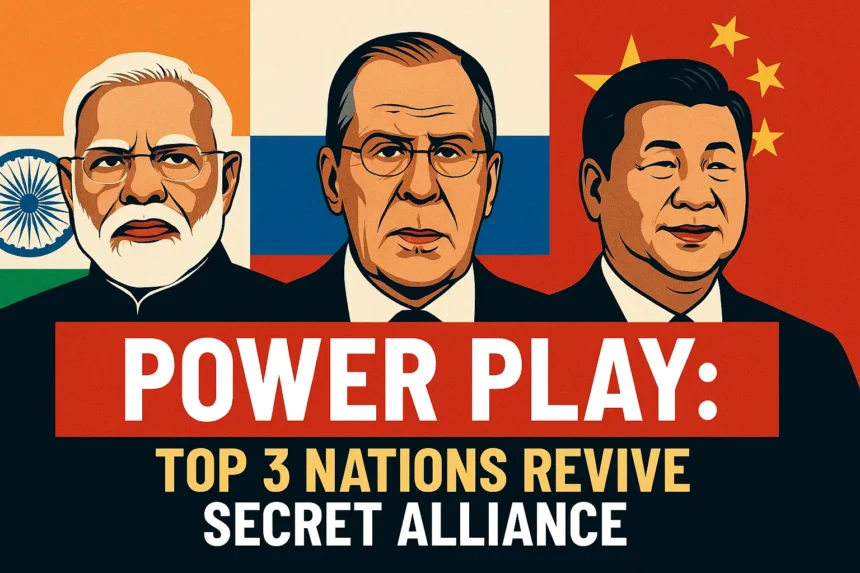Top 3 Nations Revive Secret Alliance
Why Lavrov’s Statement Sent Shockwaves Worldwide
Russian Foreign Minister Sergei Lavrov’s call to reactivate the India-Russia-China trio sent shockwaves globally, signaling a major shift in the world order. At a time of rising U.S.-China tensions and Western dominance, his statement hinted at a new strategic alignment that could redefine global power dynamics and challenge Western influence.
A Geopolitical Shockwave the World Didn’t Expect
In a move that sent ripples across global diplomatic circles, Russian Foreign Minister Sergei Lavrov recently made a bold call to reactivate the India-Russia-China (RIC) alliance, a powerful trio with the potential to reshape the world order. At a time when global tensions are escalating and trust in Western leadership is wavering, Lavrov’s statement has ignited new debates, concerns—and hopes.
But why now? Why is this old trio being revived—and why is the United States visibly uncomfortable?
The Context: A Changing World and a New Power Equation
Lavrov’s statement didn’t come out of the blue.
With Donald Trump’s return to U.S. leadership stirring uncertainty, countries across the globe are quietly seeking new alliances, new stability, and new leadership. Amid this shifting landscape, India has risen as a symbol of balance—an emerging economic and diplomatic powerhouse that’s respected across geopolitical fault lines.
And Russia knows it.
The time has come to activate the trio of Russia, India, and China, said Lavrov at a high-level Eurasian conference in Perm. His statement wasn’t just diplomatic rhetoric—it was a signal to the world: the East is uniting.
Why India, Russia, and China—And Why Now?
Let’s break it down. According to Dr. Abhishek Srivastava, a geopolitical expert from JNU, the world is rapidly moving towards a multipolar structure—one where power is no longer dominated by a single superpower like the U.S., but spread across influential regional giants.
And in this emerging world:
- India is the 4th largest economy globally.
- It’s led by PM Narendra Modi, seen by many as a stabilizing global figure.
- India maintains excellent relations with both Western and Eastern blocs.
- It champions peace, diplomacy, and development, and excels in technology, trade, and soft power.
On the other hand:
- Russia is at odds with the U.S. and Europe over the Ukraine war.
- China is a strategic and economic rival of the U.S..
- Both Russia and China understand India’s importance and influence.
Lavrov sees a future where this trio doesn’t just cooperate—but balances the West in a global power structure.
Why the U.S. and Europe Are Alarmed
Lavrov’s statement has raised eyebrows in Washington and Brussels. The idea of a consolidated front of three massive countries—each with significant military, technological, and economic clout—is not a welcome development for the West.
He even accused NATO of trying to “coax” India into anti-China conspiracies, revealing that Moscow believes the West is nervous about losing its grip on Asia’s largest democracy.
Our Indian friends can clearly see through these provocative moves, Lavrov added, referencing confidential diplomatic talks.
What’s Changed Since Galwan?
The RIC trio had gone quiet since the 2020 Galwan Valley standoff between India and China. Trust was broken. Meetings were shelved. But now, Lavrov says, there’s “a consensus” on normalizing India-China relations.
He believes both Asian giants are actively working toward de-escalation and collaboration—and that this is the perfect moment to reactivate RIC.
He reminded the world that this format was initiated years ago by former Russian Prime Minister Yevgeny Primakov, and over 20 high-level ministerial meetings had been held under this initiative in the past.
What’s at Stake?
If revived and strengthened, the RIC alliance could:
- ✅ Become a strategic counterweight to Western dominance.
- ✅ Boost trade, tech collaboration, and energy security in Asia.
- ✅ Act as a peace-keeping force in emerging regional conflicts.
- ✅ Promote multipolarity, giving smaller nations more choices.
But it could also mean:
- ❌ Increased Western pressure on India to choose sides.
- ❌ Greater geopolitical friction between blocs.
- ❌ Challenges in balancing differing interests between the trio.
Expert Insight: India Holds the Key
India is in a unique position—it shares strong ties with both Russia and the U.S., while also maintaining crucial trade relations with China. But can it truly balance these relationships?
According to Dr. Srivastava, India’s credibility and neutrality make it the perfect bridge between conflicting powers. But its decisions in the coming months will determine the future of this trio.
Emotional Undercurrent: A New World Hope or Cold War 2.0?
For some, this alliance rekindles hope in a more balanced, fairer world—one not dictated solely by Washington or Brussels. For others, it’s a signal of an upcoming geopolitical storm, a cold-war-like division of powers.
Either way, Lavrov’s statement has opened a new chapter in global diplomacy—and the world is watching closely.
Final Thoughts: Is RIC the Future of Global Leadership?
As power continues to shift from West to East, alliances like RIC could redefine diplomacy, trade, and security for decades. Whether this alliance becomes a reality or remains an ambitious vision depends largely on how the trio navigates their internal challenges and external pressures.
But one thing is clear:
The world is no longer unipolar—and it’s never going back.
What’s Next?
- Will India lean into the RIC framework or maintain its balancing act?
- Can China and India truly move past their border tensions?
- How will the U.S. react to this potential power bloc?
- Stay tuned. Because this is just the beginning.
Enjoyed the article?
Share it with a friend curious about world affairs.
Bookmark this blog for more updates on global geopolitics.
Follow us for daily insights on international diplomacy and power shifts.
Most read: https://tnheadlines24.com/pahalgam-attack-mastermind/
Also read: https://tnheadlines24.com/musk-is-breaking-with-trump/
Disclaimer: The views and opinions expressed in this article are based on publicly available information and expert commentary. TN HEADLINES24 does not claim responsibility for the accuracy or authenticity of statements made by political figures or third-party sources mentioned herein.








